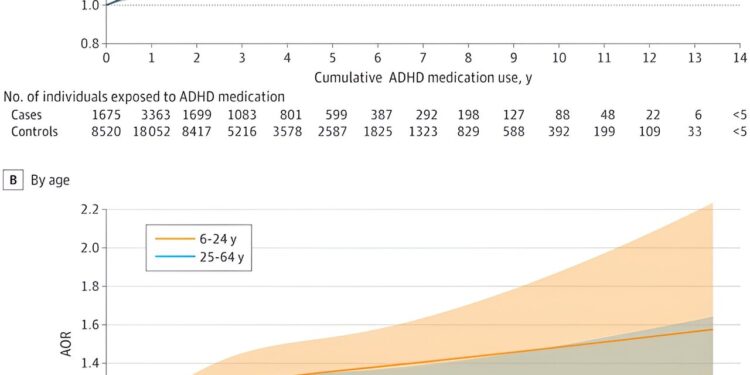Association between cumulative medication use for attention-deficit/hyperactivity disorder (ADHD) and cardiovascular disease risk. Solid lines represent adjusted odds ratios and shaded areas represent 95% CIs. In the restricted cubic spline analysis, knots were placed at the 10th, 50th, and 90th percentiles of ADHD medication use. Credit: JAMA Psychiatry (2023). DOI: 10.1001/jamapsychiatry.2023.4294
A large proportion of patients who start taking ADHD medications, especially young adults, stop within the first year. However, people who use ADHD medications for a long time and in higher-than-average doses appear to have a higher risk of certain cardiovascular diseases. This is revealed by two new studies carried out by researchers at Karolinska Institutet and published in Lancet psychiatry And JAMA Psychiatry.
More than half of all adolescents, young adults, and adults given ADHD medications had stopped taking them within the first year. The proportion of children for whom decisions were made by their parents or guardians was slightly lower, but 35% of them still stopped treatment within a year. The multinational study led by researchers at Karolinska Institutet in Sweden was published in Lancet psychiatry.
Risk of falling through the cracks
Researchers analyzed prescription data from more than 1.2 million patients who started treatment for ADHD in Australia, Denmark, Hong Kong, Iceland, the Netherlands, Norway, the United Kingdom, in Sweden and the United States. The trend was the same in all countries/regions.
“It is unlikely that so many people will stop treatment because their ADHD symptoms have disappeared, meaning the high rate of early discontinuation may pose a major barrier to effective treatment,” says lead researcher Zheng Chang in the Department of Medical Epidemiology and Biostatistics at the University of Toronto. Karolinska Institutet which led both studies. “We were unable to analyze direct causes in this study, but common reasons why ADHD medications are stopped are side effects and lack of effect.”
The highest treatment discontinuation rate was observed among 18 to 19 year olds. This is when they leave child and adolescent psychiatry to enter adult psychiatry, a transition where they risk falling through the cracks. This is a gap that health services must address, researchers say.
“We need to improve the transition to adult psychiatry and raise awareness that problems associated with ADHD often persist over time,” says Isabell Brikell, research coordinator at the Department of Medical Epidemiology and Biostatistics at Karolinska Institutet and the one of the first authors of the study in Lancet psychiatry. “Additionally, new digital tools such as simple SMS-based inventions could be used to help people with ADHD manage their medications.”
Denmark stands out
One country that stands out in the statistics is Denmark, where the proportion of children who stop treatment within a year is much lower: 18%, compared to an average of 35%. Compared to other Nordic countries like Sweden and Norway, the prescription of ADHD medications is lower, which could suggest that medications are only prescribed to those with severe ADHD who need them most , say the researchers.
“Sweden has a relatively high prescription rate for ADHD medications compared to many other European countries, so it’s possible that we overprescribe here,” says Zheng Chang.
In another study of more than 275,000 Swedish ADHD patients, now published in JAMA Psychiatry, Dr. Chang and his research group examined the use of ADHD medications over a period of up to 14 years. They were then able to show that ADHD medications, taken for a longer period and in higher doses than average, are associated with a higher risk of certain cardiovascular diseases, mainly hypertension and arterial diseases.
In general, the risk of cardiovascular disease increases by about 4% per year. The increase in risk was greater during the first years of treatment, then stabilized, and it was only statistically significant at doses greater than 1.5 times the average daily dose (called defined daily dose, DDD). This means that people treated with lower doses are not likely to develop cardiovascular disease, according to the researchers.
Patients must be monitored
“There is a long list of medications that have been associated with an increased risk of hypertension when used long-term, such as the one found here. So patients should not be alarmed by these findings,” says Le Zhang, postdoctoral researcher in Dr. Chang’s research group and first author of the JAMA Psychiatry study.
“However, in clinical practice, the increased risk must be carefully weighed on a case-by-case basis against the recognized benefits of treatment. Physicians should also regularly monitor patients with ADHD for signs and symptoms of cardiovascular disease while they are on long-term treatment.”
Since this is an observational study, it is not possible to conclude that it is ADHD medications that lead to an increased risk of cardiovascular disease. As the researchers point out, this could depend on other medications, the severity of symptoms, or lifestyle factors.
More information:
Isabell Brikell et al, Discontinuation and persistence of ADHD medications across the lifespan: a retrospective observational study using population-based databases, Lancet psychiatry (2023). DOI: 10.1016/S2215-0366(23)00332-2
Le Zhang et al, Medications for attention-deficit/hyperactivity disorder and long-term risk of cardiovascular disease, JAMA Psychiatry (2023). DOI: 10.1001/jamapsychiatry.2023.4294
Provided by the Karolinska Institute
Quote: New results on the long-term treatment of ADHD and link with cardiovascular diseases (November 28, 2023) retrieved on November 28, 2023 from
This document is subject to copyright. Except for fair use for private study or research purposes, no part may be reproduced without written permission. The content is provided for information only.



